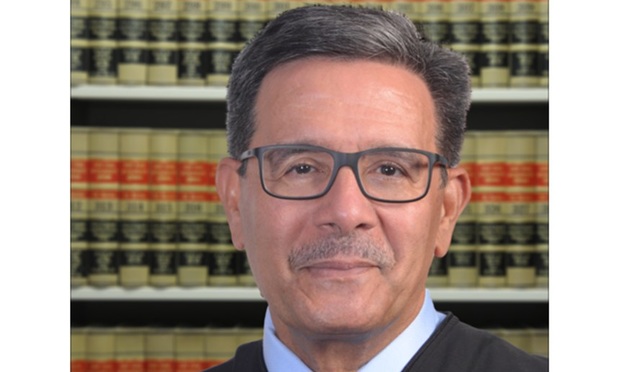 Rolando T. Acosta
Rolando T. Acosta A Crisis of Faith (in the Rule of Law)
Rolando T. Acosta, Presiding Justice of the Appellate Division, First Department writes about the importance of civic education, as the rule of law depends on the public's faith in government and an understanding of how it works.
April 30, 2021 at 10:20 AM
9 minute read
When President Eisenhower proclaimed the first Law Day in 1958, he sought "to remind us all that we as Americans live, every day of our lives, under a rule of law. Freedom under law is like the air we breathe. People take it for granted and are unaware of it—until they are deprived of it." Statements of the President and Chief Justice on Law Day—U.S.A., 44 A.B.A. J. 544 (1958). Indeed, the rule of law feels to many of our fellow citizens like an abstract concept, on which even some judges have only a "superficial grasp." See Patricia Timmons-Goodson, The Bell Tolls for the Rule of Law, Judges' J., Winter 2008, at 32, 33. But to those of us who have lived in countries where the rule of law has not always been followed, the concept is cherished as integral to a healthy democracy.
I remember what it was like growing up in a country where respect for the rule of law was flimsy at best, and I have previously written about my father's experiences living under a dictatorship in our native Dominican Republic. Rolando T. Acosta, Separation of Powers: A Tribute to My Father, NYLJ, May 1, 2018, at 10, col. 1. To my father, the rule of law, like the separation of powers, "was not a lofty concept taught in school; he knew it was a necessary ingredient to bring the dream of liberty and good government to fruition." Id. It is important for those of us who have personally experienced a breakdown in the rule of law to share our stories, for "[t]he clearest way to show what the rule of law means to us in everyday life is to recall what has happened where there is no rule of law." THE NATION: May Day, U.S.A., Time, May 5, 1958 (quoting President Eisenhower's Law Day remarks).
This content has been archived. It is available through our partners, LexisNexis® and Bloomberg Law.
To view this content, please continue to their sites.
Not a Lexis Subscriber?
Subscribe Now
Not a Bloomberg Law Subscriber?
Subscribe Now
NOT FOR REPRINT
© 2025 ALM Global, LLC, All Rights Reserved. Request academic re-use from www.copyright.com. All other uses, submit a request to [email protected]. For more information visit Asset & Logo Licensing.
You Might Like
View All


Law Firms Mentioned
Trending Stories
- 1New York State Authorizes Stand-Alone Business Interruption Insurance Policies
- 2Buyer Beware: Continuity of Coverage in Legal Malpractice Insurance
- 3‘Listen, Listen, Listen’: Some Practice Tips From Judges in the Oakland Federal Courthouse
- 4BCLP Joins Saudi Legal Market with Plans to Open Two Offices
- 5White & Case Crosses $4M in PEP, $3B in Revenue in 'Breakthrough Year'
Who Got The Work
J. Brugh Lower of Gibbons has entered an appearance for industrial equipment supplier Devco Corporation in a pending trademark infringement lawsuit. The suit, accusing the defendant of selling knock-off Graco products, was filed Dec. 18 in New Jersey District Court by Rivkin Radler on behalf of Graco Inc. and Graco Minnesota. The case, assigned to U.S. District Judge Zahid N. Quraishi, is 3:24-cv-11294, Graco Inc. et al v. Devco Corporation.
Who Got The Work
Rebecca Maller-Stein and Kent A. Yalowitz of Arnold & Porter Kaye Scholer have entered their appearances for Hanaco Venture Capital and its executives, Lior Prosor and David Frankel, in a pending securities lawsuit. The action, filed on Dec. 24 in New York Southern District Court by Zell, Aron & Co. on behalf of Goldeneye Advisors, accuses the defendants of negligently and fraudulently managing the plaintiff's $1 million investment. The case, assigned to U.S. District Judge Vernon S. Broderick, is 1:24-cv-09918, Goldeneye Advisors, LLC v. Hanaco Venture Capital, Ltd. et al.
Who Got The Work
Attorneys from A&O Shearman has stepped in as defense counsel for Toronto-Dominion Bank and other defendants in a pending securities class action. The suit, filed Dec. 11 in New York Southern District Court by Bleichmar Fonti & Auld, accuses the defendants of concealing the bank's 'pervasive' deficiencies in regards to its compliance with the Bank Secrecy Act and the quality of its anti-money laundering controls. The case, assigned to U.S. District Judge Arun Subramanian, is 1:24-cv-09445, Gonzalez v. The Toronto-Dominion Bank et al.
Who Got The Work
Crown Castle International, a Pennsylvania company providing shared communications infrastructure, has turned to Luke D. Wolf of Gordon Rees Scully Mansukhani to fend off a pending breach-of-contract lawsuit. The court action, filed Nov. 25 in Michigan Eastern District Court by Hooper Hathaway PC on behalf of The Town Residences LLC, accuses Crown Castle of failing to transfer approximately $30,000 in utility payments from T-Mobile in breach of a roof-top lease and assignment agreement. The case, assigned to U.S. District Judge Susan K. Declercq, is 2:24-cv-13131, The Town Residences LLC v. T-Mobile US, Inc. et al.
Who Got The Work
Wilfred P. Coronato and Daniel M. Schwartz of McCarter & English have stepped in as defense counsel to Electrolux Home Products Inc. in a pending product liability lawsuit. The court action, filed Nov. 26 in New York Eastern District Court by Poulos Lopiccolo PC and Nagel Rice LLP on behalf of David Stern, alleges that the defendant's refrigerators’ drawers and shelving repeatedly break and fall apart within months after purchase. The case, assigned to U.S. District Judge Joan M. Azrack, is 2:24-cv-08204, Stern v. Electrolux Home Products, Inc.
Featured Firms
Law Offices of Gary Martin Hays & Associates, P.C.
(470) 294-1674
Law Offices of Mark E. Salomone
(857) 444-6468
Smith & Hassler
(713) 739-1250







